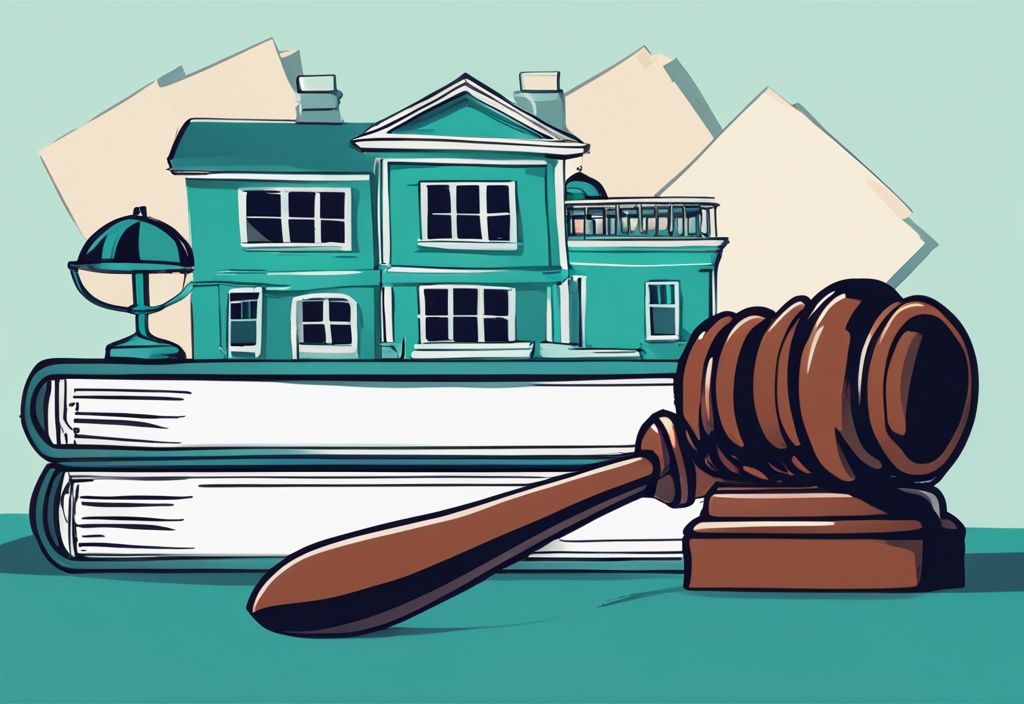Ever been stumped by the term ‘Lis Pendens’ in the real estate realm? Well, you’re not alone. It’s a seemingly intimidating phrase for many folks – but fear not. With a little wisdom from a seasoned property pro, you’ll be sifting through this complex terrain like you’ve been doing it for years.
In essence, a ‘lis pendens’ denotes a property entangled in legal squabbles, influencing its marketability and ownership, which is an important aspect of understanding real estate as defined in more detail at https://www.law.cornell.edu/wex/real_estate. However, my aim here is to help you navigate through these dense legal underbrush and break down the implications, the filing process, and what to do when you encounter lis pendens in your property journey.
If you’re a buyer, a seller, or just curious about real estate lingo, keep reading. Because understanding this little Latin phrase could potentially save you from a great deal of legal trouble!
Understanding the Meaning and Legal Implications of Lis Pendens
Lis pendens, a Latin term that translates to “lawsuit pending,” plays a crucial role in real estate law. This term acts as an alert to the public about ongoing litigation involving a property claim. Typically, when such a lawsuit is filed, a lis pendens notice gets recorded in the county land records office where the property is located. This process ensures that any potential buyer or lender is aware that the property’s title is in dispute.
The main purpose of a lis pendens is to inform potential buyers that the property’s ownership might be subject to court decisions. Buying a property with a lis pendens means the buyer takes on any litigation risks involved. It’s key to remember that a lis pendens can only be filed if the legal claim is directly related to the property in question.
This notice can pose a potential financial liability for any new property owner, depending on the lawsuit’s outcome. Lis pendens are often used in divorce cases where real estate asset division is unresolved. They are also common in scenarios involving mortgage defaults or foreclosures, providing public notice of these disputes.
Contract disputes over property sales can also lead to the filing of a lis pendens. For instance, if a party believes they have a right to the property under a contract, filing this notice alerts others of their interest. This creates what is known as “constructive notice,” meaning any conveyances or encumbrances made after the filing are subject to the litigation’s outcome.
Filing a Lis Pendens Notice: Procedure and Impact
Understanding what is lis pendens in real estate is essential before diving into the filing process. Rules for filing a lis pendens can vary from state to state, so it’s crucial to get a grip on the specific laws in your area. Generally, the journey starts with filing a lawsuit related to the property at the county clerk’s office.
Recording the lis pendens in the county land records is a must since it links the notice to the property’s title. This step serves as a heads-up to any potential buyers or lenders about the ongoing litigation.

It’s a wise move to consult a real estate lawyer who can guide you through the state-specific procedures and help you sidestep any legal slip-ups. Your lis pendens notice needs to be thorough, including names of the involved parties, the lawsuit’s initiation date, the case number, the court handling the case, a clear description of the property, and the type of relief sought regarding the property. Although recording a lis pendens is a significant move, it doesn’t violate the property owner’s procedural due process rights. It simply informs the public of any existing claims on the property.
This official notice can greatly impact the property’s marketability. It alerts potential buyers and financiers about the property’s disputed ownership status. Therefore, knowing what is lis pendens in real estate provides property owners and potential buyers with the insight needed to handle such notifications carefully and in line with the law.
Key Examples of Lis Pendens Scenarios in Real Estate
Lis pendens might sound like a complex legal term, but it essentially means “pending lawsuit.” In real estate, it serves as a critical notice that alerts everyone about ongoing litigation involving a property. This section explores various scenarios where a lis pendens could come into play.
Divorce Cases Where Real Estate Assets are Not Yet Distributed
Imagine you’re going through a divorce and things get sticky with property division. It’s not uncommon for one party to file a lis pendens to ensure that the property isn’t sold or transferred until the dispute is resolved. This serves as a red flag for potential buyers, indicating that the ownership is up in the air until everything is legally sorted out. If you’re involved in such disputes, consulting with real estate lawyers in Maine can be crucial to protect your interests. The whole process can drag on, keeping the notice in place until a judge gives the final word.
Mortgage Default or Foreclosure Cases
Nobody wants to be in a situation where they can’t keep up with mortgage payments, but it happens. When lenders start foreclosure proceedings, they file a lis pendens to let everyone know the property is tied up in a legal battle. So, if you’re considering buying such a property, you’ll be aware that its title is under dispute. It’s a caution sign, urging you to proceed with your eyes wide open.
Contract Disputes Regarding the Sale of a Property
Picture this: You’re in the middle of selling your house, but an argument breaks out over the contract terms. One party can file a lis pendens to officially declare there’s an issue. This legal notice makes it clear that the property’s sale conditions are being contested, putting a hold on any transactions until things are ironed out. It’s a protective measure, keeping buyers hesitant and ensuring the dispute gets the attention it needs.
Homeowners Associations and Unpaid Fees
Living in a community with a homeowners association (HOA) comes with its own set of rules and fees. If a homeowner falls behind on these fees or breaches the community’s covenants, the HOA might file a lis pendens. This move brings attention to the HOA’s claims, letting potential buyers know that there are unresolved issues attached to the property. It’s the HOA’s way of making sure they’re addressed before the property changes hands.
Distressed Properties Facing Foreclosure
Properties on the brink of financial ruin often come with their share of legal complexities. A lis pendens is common for distressed properties heading towards foreclosure, signaling to buyers and investors that the property’s standing is shaky. This notice serves as a heads-up about ongoing proceedings that could impact the purchase, ensuring everyone knows what they’re getting into before any money changes hands.
Consequences of a Lis Pendens Notice for Buyers and Sellers
When dealing with what is lis pendens in real estate, it’s important to grasp the impact on both buyers and sellers. If you’re a buyer, purchasing a property marked by a lis pendens means stepping into ongoing litigation. This legal term essentially broadcasts that the property’s ownership is under dispute, effectively waving a red flag to any potential buyer. Think of it as buying a house with a significant “under construction” sign on its title—you’re buying the property but also inheriting the legal battles that come with it.
Now, for sellers, having a lis pendens tagged to a property poses substantial hurdles. Such a notice can be like a rain cloud over a sunny day, casting a shadow on the property’s appeal. Buyers are automatically wary of the hassle and legal entanglements that come with it. This fear can lead to a longer time on the market and potentially lower offers. Picture having an amazing car to sell but with a history of unresolved accidents. Naturally, fewer people would be excited to take it off your hands.

If the litigation doesn’t resolve in favor of the current owner, new buyers could lose the property altogether or might be forced to deal with the plaintiff’s claim. This layer of uncertainty makes transactions involving lis pendens particularly risky. It’s also a public record, easily discovered through routine title searches, further adding to potential buyers’ hesitation to proceed.
Moreover, owning a property with a lis pendens notice means you’re signing up for possible future liabilities. You’re essentially buying the house and a big “What If?” ticket attached to it—involving legal and financial responsibilities that could spring up from the unresolved court case. For both buyers and sellers, navigating through these murky waters calls for sound legal advice and a solid comprehension of what is lis pendens in real estate and its extensive implications.
Removing a Lis Pendens: Steps and Legal Requirements
Understanding what is lis pendens in real estate helps illuminate the complexities involved in removing this legal notice. In most cases, the removal process entails resolving the underlying lawsuit or obtaining a court order to lift the lis pendens. Let’s dive into the steps you’ll need to take to remove a lis pendens from your property.
The primary step is to address the root cause of the lis pendens. Often, this involves negotiation or litigation to settle the dispute or reach a legal resolution. Think of it like untangling a knot; you need to carefully work through the issues that brought about the lis pendens in the first place.
Once the dispute is resolved, the court can issue an order to remove the lis pendens. This step signifies that your property is free from the legal claim that initiated the notice. Imagine the court order as a clean bill of health for your property’s title, restoring its marketability and providing peace of mind for potential buyers.
Next, after obtaining the necessary court order or resolving the dispute amicably, you must record a formal notice of cancellation or withdrawal of the lis pendens. This notice needs to be filed with the county land records office where the original lis pendens was recorded. This step is like updating your property’s status on a public bulletin board, notifying all interested parties that the property is no longer subject to pending litigation.
Effectively removing a lis pendens requires careful attention to legal procedures and documentation. Consulting with a real estate attorney is a smart move to ensure compliance with state-specific requirements and proper handling of all legal aspects. This professional guidance is crucial for navigating the complexities associated with lis pendens, protecting property rights, and ensuring a smooth transaction process.
Remember, dealing with a lis pendens can seem daunting, but with the right approach and help from a qualified attorney, you can successfully clear this hurdle. Whether you’re resolving the underlying lawsuit or filing the needed paperwork, sticking to these steps will help you lift that lis pendens and move forward with confidence.
The Importance of Legal Advice When Dealing with Lis Pendens in Real Estate
Understanding what is lis pendens in real estate is crucial for anyone involved in property transactions. Essentially, lis pendens signals an ongoing lawsuit impacting the title of a property, and this can lead to all sorts of legal twists and turns. This is where having knowledgeable advice really makes a difference.
Consulting a real estate professional or attorney is like having a seasoned co-navigator through these potentially choppy waters. These experts not only break down the legalese but also shine a light on what each scenario might mean for you, helping to ensure you’re not making decisions in the dark.
Consider this: laws and filing procedures for lis pendens can vary dramatically depending on where you are. This is why enlisting the help of a real estate lawyer who is familiar with your state-specific procedures can be invaluable. Their expertise ensures that all necessary documents are correctly prepared and filed, offering you peace of mind.
Furthermore, professional advice plays a pivotal role in ensuring an understanding of your rights and potential impacts associated with a lis pendens notice. Knowing these can help both buyers and sellers alike navigate through the legal maze more confidently. It empowers you to make informed decisions, whether you’re contemplating moving forward with a transaction or considering contesting a claim.

Conclusion
Grasping what is lis pendens in real estate can feel like mastering a critical part of your property knowledge toolkit. Essentially, a lis pendens signifies an ongoing legal dispute over a property claim. Think of it as a formal public notice indicating that the ownership of the property is under legal scrutiny. This notice can seriously affect the property’s marketability. As a potential buyer, stepping into such a scenario means you might be diving into the middles of a legal tussle and assuming the associated risks.
Filing and removing a lis pendens is not just paperwork; it involves a set of legal procedures that differ from state to state. Usually, you start by filing a lawsuit to establish a lis pendens, and to remove it, you either resolve the lawsuit or obtain a court order to dismiss it. This maze of legal processes can feel overwhelming. That’s why turning to an experienced real estate attorney is a wise move. They can help you understand your specific state’s requirements and guide you through the legal landscape with ease. This proactive step is crucial to safeguard your property rights and make informed decisions about any real estate that has a lis pendens.
Frequently Asked Questions
What Does Lis Pendens Mean in Real Estate?
Ever stumbled across the term lis pendens and wondered what it means? In real estate, it translates from Latin to “lawsuit pending”. Think of it as a formal heads-up letting everyone know that a property is caught up in a legal dispute. This notice serves as a caution to potential buyers or lenders, signaling that the property’s title is under legal scrutiny.
Can a Property be Sold With a Lis Pendens?
Yes, you can sell a property with a lis pendens attached, but it does come with its set of risks for the buyer. Picture this: by buying the property, you’re stepping into the middle of an ongoing court case. This means you’re bound by any court decisions and may have limited sway over the litigation. Understandably, sellers might find it tough to pique the interest of potential buyers under these conditions.
How Long Does a Lis Pendens Last?
The duration of a lis pendens can vary greatly. It hangs around for as long as the related lawsuit remains unresolved. Sometimes, this notice could linger for several months or even drag on for years, all depending on how long the litigation process takes. It vanishes only when the lawsuit wraps up or a court decides to lift it.
Who Can File a Lis Pendens Notice?
Basically, anyone who has a legal claim on a property and is involved in a pending lawsuit can file a lis pendens. Regular filers include spouses entangled in divorce battles, lenders dealing with mortgage defaults, and parties in disputes over real estate contracts.
Is a Lis Pendens the Same as a Lien?
It’s a common mix-up, but no, a lis pendens isn’t the same as a lien. A lis pendens is tied directly to an active lawsuit, hinting at a pending claim on the property. On the other hand, liens represent direct claims against your property for unpaid debts or services. These can be recorded even before any litigation kicks off. To understand how property value adjustments can impact your financial situation, learn more about accelerated depreciation in real estate.
Hi, I’m Alex Harper, a real estate expert with over ten years of experience in property management and legal advice. My passion is making the often complicated world of real estate understandable. I share practical tips and simple solutions to help you make better decisions – whether you’re buying a home, renting or just want to learn more about the industry. With my knowledge and experience, I want you to feel well-informed and confident in your real estate projects. Let’s tackle this together!




